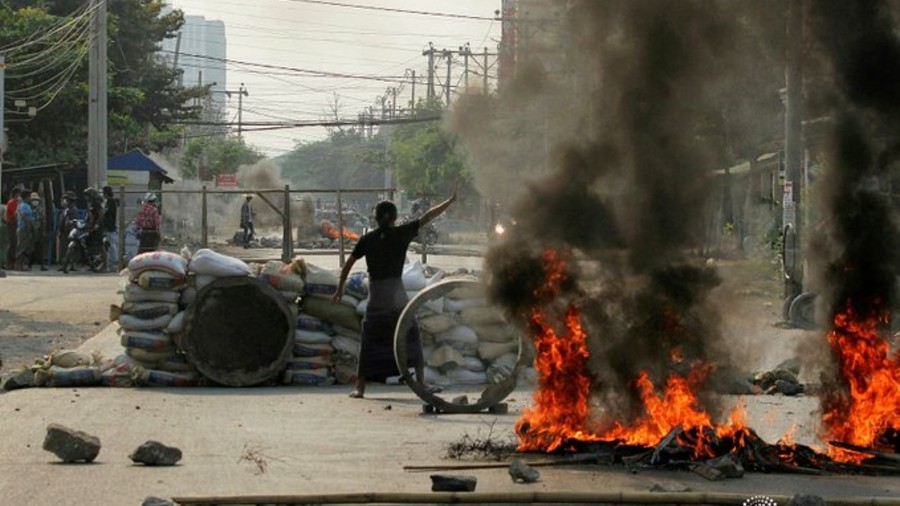The EU on Monday imposed sanctions on 11 people linked to last month’s military coup in Myanmar as the repression of pro-democracy protesters by security forces reached what Germany's foreign minister called “an unbearable extent”.
The sanctions marked the 27-nation bloc’s most significant response since the overthrow of Aung San Suu Kyi’s elected government on February 1. The individuals targeted included General Min Aung Hlaing, the commander-in-chief of the Myanmar military.
At least 250 people have been killed so far in the crackdown on the protests, according to figures from the Assistance Association for Political Prisoners (AAPP) activist group.
Three people were killed in Myanmar’s second city, Mandalay in renewed unrest on Monday, including a 15-year-old boy, witnesses and news reports said.
EU foreign ministers adopted the travel bans and asset freezes on the individuals at a meeting in Brussels. So far, the EU has an arms embargo on Myanmar and it has targeted some senior military officials since 2018.
“We are going to take sanctions against 11 persons involved in the coup and the repression of the demonstrators,” EU foreign policy chief Josep Borrell said.
German foreign minister Heiko Maas told reporters before the meeting that the crackdown “has reached an unbearable extent, which is why we will not be able to avoid imposing sanctions”.
Among the individuals targeted are Min Aung Hlaing, Myint Swe, who has been acting president since the coup, and other senior military and administration staff.
Stronger measures are expected soon as the bloc moves to take aim at the businesses run by the military.
EU diplomats have told Reuters that parts of the military’s conglomerates, Myanmar Economic Holdings Limited (MEHL) and Myanmar Economic Corporation (MEC), are likely to be targeted, barring EU investors and banks from doing business with them.
The conglomerates are spread throughout the economy from mining and manufacturing to food and beverages to hotels, telecoms and banking.
A UN fact-finding mission in 2019 recommended sanctions against the two companies and their subsidiaries, saying they gave the army extra sources of revenue that could finance human rights violations.
“We don’t intend to punish the people of Myanmar but those who blatantly violate human rights,” Maas said.
The new sanctions follow a US decision last month to target the military and its business interests. Britain, the former colonial power, last month froze the assets and placed travel bans on three generals over the coup. Myanmar has been locked in crisis since the coup, with protesters taking to the streets daily and a campaign of civil disobedience unfolding. The junta says a November 8 election won by Suu Kyi’s party was fraudulent, an accusation rejected by the electoral commission. Military leaders have promised a new election but have not set a date and have declared a state of emergency.
Suu Kyi, a 75-year-old Nobel peace laureate, and other figures in her National League for Democracy are being held in detention while an array of accusations have been levelled at her, including bribery. Her lawyer says the charges are trumped up.
In the latest violence, three people were killed in Mandalay, witnesses and the Myanmar Now news portal said. Tun Tun Aung, a 15-year-old, was killed in his hut when security forces opened fire in the city’s Mya Yi Nandar area, his sister said.
“My brother was sitting next to the window,” she said. “We live in the squatters area. Our house is not strong enough to stop bullets.” Six people were killed and several wounded in the city on Sunday, Myanmar Now reported. State media said on Sunday that men on motorcycles attacked a member of the security forces who later died. The military said two policemen were killed in earlier protests. The weeks of violence haves forced many citizens to think up novel ways to protest.
In a patch of woodland in western Mon state, trees have been decorated with condoms and portraits of the junta leader with a sign saying: “Min Aung Hlaing’s father should have used a condom”. Motorists honked car horns in downtown areas of Yangon in a sign of protest.
In the western town of Mindat in Chin state, protesters planted scores of posters in a square in front of the main market saying: “Military dictatorship must fail”. Elsewhere, protesters replaced crowds of people with pots and pans, stuffed toys, dolls or toy cars, all carrying anti-junta signs.











